- VA Announces Expansion of "Close to Me" Cancer Program as Part of the Cancer Moonshot, Bringing Cancer Diagnosis and Treatment Closer to Thousands of Veterans
- Biden-Harris Administration Releases National Strategy for Suicide Prevention and First-Ever Federal Action Plan
- Biden-Harris Administration Takes Historic Action to Increase Access to Quality Care, and Support to Families and Care Workers
- Biden Administration Sets Higher Staffing Mandates. Most Nursing Homes Don't Meet Them.
- Rural Jails Turn to Community Health Workers To Help the Newly Released Succeed
- Rural Communities Face Primary Care Physician Shortage
- Miles for Milk: How Student-Run Grocery Store Reshaped Rural Community's Food Access
- Native Americans Have Shorter Life Spans, and It's Not Just Due to Lack of Health Care
- Promotoras Play Essential Role in Connecting Farmworkers with Health Care in Rural NorCal
- Across the Country, Amish Populations Are on the Rise
- Using Medicaid to Address Young People's Mental Health Needs in School Settings
- Sunsets, Wildlife and Limited Care: Challenges of Aging in Place in Rural America
- City-Country Mortality Gap Widens amid Persistent Holes in Rural Health Care Access
- Tribal Environmental Impact Network
- Minnesota's Rural Ambulance Providers Look to State Capitol for Their Own Lifeline
East Lycoming Ambulance Association Receives Rural Health Program of the Year Award
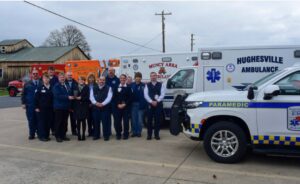 The East Lycoming Ambulance Association (ELAA), Hughesville, PA, received the Rural Health Program of the Year award, presented by the Pennsylvania Office of Rural Health (PORH). The award was presented by Lisa Davis, director of PORH and outreach associate professor of health policy and administration at Penn State, on Nov. 17 at the ELAA headquarters in Hughesville.
The East Lycoming Ambulance Association (ELAA), Hughesville, PA, received the Rural Health Program of the Year award, presented by the Pennsylvania Office of Rural Health (PORH). The award was presented by Lisa Davis, director of PORH and outreach associate professor of health policy and administration at Penn State, on Nov. 17 at the ELAA headquarters in Hughesville.
The Rural Health Program of the Year Award recognizes an exemplary health program that addresses an identified need in a rural community by utilizing unique, creative, and innovative approaches to do so.
The award was presented during 2022 Rural Health Week in Pennsylvania, Nov. 14-18. The week encompasses Nov. 17, which is National Rural Health Day, established in 2011 by the National Organization of the State Offices of Rural Health. Both events celebrate “The Power of Rural” by honoring rural American residents, health care providers, and communities.
The nomination, submitted by Joshua Dorman, ambulance captain at the Hughesville Volunteer Fire Department, Hughesville, PA, recognized the 20-year cooperative effort between four volunteer fire departments, Hughesville Volunteer Fire Company, Muncy Area Volunteer Fire Company, Picture Rocks Volunteer Fire Company, and Muncy Township Volunteer Fire Company. The association is completely self-funded by these fire companies which underwrite Emergency Medical Technicians (EMT) wages and provide the necessary equipment and facility to provide emergency services in rural Pennsylvania.
The fire companies staff a Basic Life Support ambulance seven days a week which is responsible for covering 911 emergency medical calls and vehicle accidents for 10 municipalities in rural Pennsylvania. Throughout the COVID-19 pandemic, this collaboration has been critical for the area due to the significant increase in emergency calls. Without these companies providing these essential services, many of those calls would go unanswered.
PORH was formed in 1991 as a joint partnership between the federal government, the Commonwealth of Pennsylvania, and Penn State. The office is one of 50 s
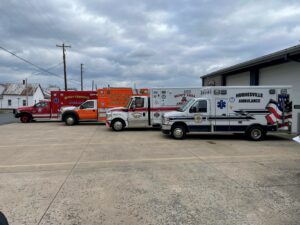
tate offices of rural health in the nation and is charged with being a source of coordination, technical assistance, networking, and partnership development.
PORH provides expertise in the areas of rural health, population health, quality improvement, oral health, and agricultural health and safety. PORH is administratively located in the Department of Health Policy and Administration in the College of Health and Human Development at Penn State University Park.
Each year, PORH presents awards to recognize rural health programs and individuals who have made substantial contributions to rural health in Pennsylvania. To learn more about the Pennsylvania Office of Rural Health, visit porh.psu.edu.
CMS Releases Framework for Advancing Health Care in Rural, Tribal, and Geographically Isolated Communities

The Centers for Medicare & Medicaid Services Office of Minority Health (CMS OMH) is recognizing the unique health care needs of individuals that live in rural, Tribal, frontier, and geographically isolated communities and territories throughout the month of November. This month, CMS will be releasing multiple new resources that show how we’re expanding on our rural health strategy and helping those that live in rural communities to achieve their optimal health, including the CMS Framework for Advancing Health Care in Rural, Tribal, and Geographically Isolated Communities.
CMS recognizes that more than 61 million Americans live in rural areas, and face several unique challenges. And those challenges can differ dramatically among the different kinds of rural areas across the country. Rural residents tend to be older and in poorer health than their urban counterparts, and rural communities often face challenges with access to care, financial viability, and the important link between health care and economic development.
Our recently released report, Advancing Rural Health Equity (PDF), outlines the various ways that CMS has gone the “extra mile” over the past year to meet the needs of rural populations, outlining activities across 10 areas of particular importance to rural health. Among the areas included are Medicare, the rural health workforce, models and demonstrations, maternal health, and COVID-19.
Additionally, we recently released the CMS Framework for Advancing Health Care in Rural, Tribal, and Geographically Isolated Communities (PDF), which builds on the previously released Rural Health Strategy (PDF) and aligns with the CMS Framework for Health Equity 2022 – 2032 (PDF) to improve health equity and reduce disparities.
As CMS OMH recognizes National Rural Health Day, we are continuing to reaffirm our commitment to helping those in rural, Tribal, frontier, and geographically isolated territories to achieve their optimal health. Below are resources that you can use to help those you serve throughout the month of November and beyond.
Join us to learn more! Register here for our November 15 webinar on the CMS Framework for Advancing Health Care in Rural, Tribal, and Geographically Isolated Communities.
Resources
- Visit our Rural Health webpage to find resources designed for the more than 50 million Americans that live in rural, Tribal, frontier, and geographically isolated territories.
- Review Advancing Rural Health Equity (PDF), which shares how CMS has met the needs of rural, Tribal, frontier, and geographically isolated communities throughout 2022.
- Review the CMS Framework for Advancing Health Care in Rural, Tribal, and Geographically Isolated Communities (PDF), which is designed to illustrate how CMS is working across its programs to promote access to high-quality, equitable care in rural, tribal, and geographically isolated communities.
- Download Rural-Urban Disparities in Health Care in Medicare (PDF), which describes rural-urban differences in health care experiences and clinical care received nationally.
- Review our Advancing Rural Maternal Health Equity Report (PDF), which provides a high-level summary of the activities that CMS OMH implemented to address maternal health disparities between June 2019 and November 2021 as a part of its Rural Maternal Health Initiative.
- View the CMS Rural Health Strategy (PDF) to learn how the Agency is applying a rural lens to new and ongoing activities, and how this approach informs the pathway by which CMS can advance the state of rural health care in America.
Sign up for our Rural Health listserv to receive the news on rural health care policy and programs.
Paid for by the US Department of Health and Human Services.
NORC Announces New Rural Health Mapping Tool to Inform COVID-19 Response
NORC at the University of Chicago (NORC) has released an interactive mapping tool that will help guide rural communities’ strategies around COVID-19. The publicly available tool provides information on COVID-19 vaccination rates, including newly released data on bivalent boosters, COVID-19 cases and hospitalizations, and other health and sociodemographic information for communities across the United States.
Rural communities and decision-makers can use this vital data, which is supplied by the Centers for Disease Control and Prevention (CDC), to inform ongoing COVID-19 vaccination efforts, particularly those related to encouraging boosters. The tool also enables free county-level exploration of data across the United States.
“The Rural Health Mapping Tool will be an invaluable resource for rural communities that are looking for accurate, up-to-date information on COVID-19 so they can choose public health strategies that best meet their needs,” said Alana Knudson, director of the Walsh Center for Rural Health Analysis.
In addition, the Rural Health Mapping Tool offers benefits far beyond the pandemic. It integrates several measures of health and prosperity into a single tool, providing a comprehensive picture of the well-being of rural communities. The tool is the first to display a publicly available county-level map of the NORC-developed prosperity index, which provides a single numerical measure designed to reflect the prosperity of a county, based on 16 indicators. With this new tool, users can observe the associations between the prosperity of a county and a range of health and other factors, including the leading causes of death, sociodemographic factors, and physical environment and access to healthcare indicators.
“We know that rural Americans face significantly more health disparities compared with their urban counterparts,” said Dr. Georgina Peacock, Director of CDC’s Immunization Services Division. “The Rural Health Mapping Tool will give communities access to crucial information that will help direct resources and ensure COVID vaccinations are reaching critical populations in rural areas.”
The Rural Health Mapping Tool has several features that are particularly useful for rural communities.
- Users can create a map view that displays only the rural counties in the United States, which will highlight areas of need and resources.
- Every county also has an individual fact sheet, which compares all county-level data to the rest of their state and to the nation.
- All data included in the tool can be downloaded for free and used by local leaders, decision-makers, researchers, and the public.
The tool is being released in observation of National Rural Health Day, which recognizes the importance of the health and well-being of our rural communities.
About NORC at the University of Chicago
NORC at the University of Chicago conducts research and analysis that decision-makers trust. As a nonpartisan research organization and a pioneer in measuring and understanding the world, we have studied almost every aspect of the human experience and every major news event for more than eight decades. Today, we partner with government, corporate, and nonprofit clients around the world to provide the objectivity and expertise necessary to inform the critical decisions facing society.
www.norc.org
NORC is home to the Walsh Center for Rural Health Analysis, a research center dedicated to improving health and well-being in all of our nation’s rural and remote communities. You can find more information on the center here.
Contact: For more information, please contact Eric Young at NORC at young-eric@norc.org or (703) 217-6814 (cell).
This initiative is supported by the Centers for Disease Control and Prevention (CDC).
Leader at Wayne Memorial Community Health Centers, Norma Nocilla, Receives Community Rural Health Leader of the Year Award
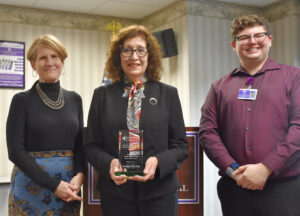 Norma Nocilla, director of clinical operations and quality at Wayne Memorial Community Health Centers (WMCHC), Honesdale, PA, received the 2022 Community Rural Health Leader of the Year Award, presented by the Pennsylvania Office of Rural Health (PORH). The award was presented by Lisa Davis, director of PORH and outreach associate professor of health policy and administration at Penn State during an award ceremony on Nov. 17, 2022, at Wayne Memorial Hospital in Honesdale, PA.
Norma Nocilla, director of clinical operations and quality at Wayne Memorial Community Health Centers (WMCHC), Honesdale, PA, received the 2022 Community Rural Health Leader of the Year Award, presented by the Pennsylvania Office of Rural Health (PORH). The award was presented by Lisa Davis, director of PORH and outreach associate professor of health policy and administration at Penn State during an award ceremony on Nov. 17, 2022, at Wayne Memorial Hospital in Honesdale, PA.
The Community Rural Health Leader of the Year Award recognizes an outstanding leader who organized, led, developed or expanded an exemplary multi-dimensional rural community health program or initiative and who has demonstrated leadership to a rural community health program.
The award was presented during 2022 Rural Health Week in Pennsylvania, Nov. 14-18. The week encompasses Nov. 17, which is National Rural Health Day, established in 2011 by the National Organization of the State Offices of Rural Health. Both events celebrate “The Power of Rural” by honoring rural American residents, health care providers, and communities.
The nomination, submitted by Kyle Davis, outreach and enrollment coordinator at WMCHC, recognized Nocilla for her extensive background in health care leadership, quality, and performance improvement. Nocilla has held various roles that provided her not only with insight into the needs of her community, but state and national issues as well. Nocilla maintained oversight of the clinical integration of four large practice groups across eight sites and 17 providers, earning primary care medical home certification of all sites, which places patients at the center of care and builds meaningful relationships between patients and clinical care teams. She shows concern and recognition for her colleagues and acknowledges the influential role they play in helping WMCHC provide exceptional services to the counties and organizations served by the health center.
Davis stated, “Ms. Nocilla has demonstrated a high level of dedication to bringing high-quality care to our communities. This dedication has been apparent in the achievements outlined above as well as her influence in creating a culture that recognizes and rewards employees for positive patient outcomes while placing an emphasis on learning and designing systems that respond to employees in a fair and just manner.”
PORH was formed in 1991 as a joint partnership between the federal government, the Commonwealth of Pennsylvania, and Penn State. The office is one of 50 state offices of rural health in the nation and is charged with being a source of coordination, technical assistance, networking, and partnership development.
PORH provides expertise in the areas of rural health, population health, quality improvement, oral health, and agricultural health and safety. PORH is administratively located in the Department of Health Policy and Administration in the College of Health and Human Development at Penn State University Park.
Each year, PORH presents awards to recognize rural health programs and individuals who have made substantial contributions to rural health in Pennsylvania. To learn more about the Pennsylvania Office of Rural Health, visit porh.psu.edu.
Agriculture Advocate Denny Hutchison Receives State Rural Health Leader of the Year Award
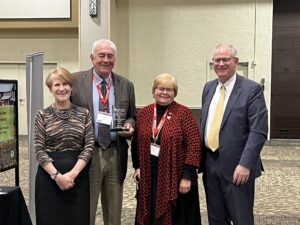
Denny Hutchison, membership chair and past president of the Somerset County Farm Bureau, and member of the Pennsylvania Farm Bureau (PFB) Agricultural Promotion Committee, from Somerset County, PA, received the Rural Health Leader of the Year award, presented by the Pennsylvania Office of Rural Health (PORH). The award was presented by Lisa Davis, director of PORH and outreach associate professor of health policy and administration at Penn State, during a ceremony on Nov. 15, 2022 at the annual PFB meeting, at the Hershey Lodge and Convention Center, Hershey, PA.
The Rural Health Leader of the Year award recognizes an outstanding leader from Pennsylvania for their work and support of rural health initiatives that address an identified need in their district or across the state.
The award was presented during 2022 Rural Health Week in Pennsylvania, Nov. 14-18. The week encompasses Nov. 17, which is National Rural Health Day, established in 2011 by the National Organization of the State Offices of Rural Health. Both events celebrate “The Power of Rural” by honoring rural American residents, health care providers, and communities.
Nominations were submitted by Pennsylvania Secretary of Agriculture Russell Redding; Pastor Nila Cogan of Somerset County; Pennsylvania Rural Development Council Executive Director Mark Critz; James Wyler, from Ambulatory and Community Behavioral Health Network Services at UPMC Western Psychiatric Hospital; and Andrea Brown from UPMC. The nominators recognized Hutchison’s superb community outreach and statewide call for support of mental health needs in local agricultural communities.
Hutchison was lauded for his assistance in developing a crisis line and underwriting training that focuses on learning about the stressors in the agricultural community, recognizing and helping someone in crisis, and developing mechanisms to mitigate the stress. During COVID-19, Hutchison raised awareness in the farming community in Somerset County, discussing rural stress and the mental burden on farmers and their families. He reached out to veterinarians, feed and equipment dealers, and others who interact with farmers to alert them to warning signs of stress and depression. He is currently working with the PFB to raise awareness and make treatment more accessible for Pennsylvania’s farmers.
Hutchison also serves as treasurer, and executive board member of the Somerset County Chamber of Commerce, as a board member of the United Way of Laurel Highlands, and is a member of the Paint Township Planning Committee. He worked for 37 years as a vocational rehabilitation counselor for the Pennsylvania Office of Vocational Rehabilitation. Hutchison is married to his wife, Lori, and enjoys time with his two daughters and two granddaughters.
PORH was formed in 1991 as a joint partnership between the federal government, the Commonwealth of Pennsylvania, and Penn State. The office is one of 50 state offices of rural health in the nation and is charged with being a source of coordination, technical assistance, networking, and partnership development.
PORH provides expertise in the areas of rural health, population health, quality improvement, oral health, and agricultural health and safety. PORH is administratively located in the Department of Health Policy and Administration in the College of Health and Human Development at Penn State University Park.
Each year, PORH presents awards to recognize rural health programs and individuals who have made substantial contributions to rural health in Pennsylvania. To learn more about the Pennsylvania Office of Rural Health, visit porh.psu.edu.
Pennsylvania Senator Elder Vogel, Jr. Receives Rural Health Legislator of the Year Award
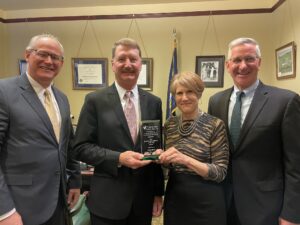
Pennsylvania Senator Elder Vogel, Jr. received the Rural Health Legislator of the Year Award, presented by the Pennsylvania Office of Rural Health (PORH). The award was presented by Lisa Davis, director of PORH and outreach associate professor of health policy and administration at Penn State, during a ceremony on Nov. 15, 2022, at the Main Capitol Building in Harrisburg, PA.
The Rural Health Legislator of the Year Award recognizes an outstanding legislator from Pennsylvania for their work and support of rural health initiatives that address an identified need in their district or across the state.
The award was presented during 2022 Rural Health Week in Pennsylvania, Nov. 14-18. The week encompasses Nov. 17, which is National Rural Health Day, established in 2011 by the National Organization of the State Offices of Rural Health. Both events celebrate “The Power of Rural” by honoring rural American residents, health care providers, and communities.
The nomination, submitted by Pennsylvania Secretary of Agriculture Russell Redding, recognized Vogel for recognizing and addressing the mental health needs of the agricultural community and bringing statewide and community attention to this important issue. As a fourth-generation farmer, Vogel is abundantly aware of the significance of this issue and the missed cries for help. He continues to discuss, share helpful resources, and advocate for the farming community. Vogel also is a compelling advocate of telemedicine for agricultural and rural communities. He sponsored legislation that has defined telemedicine and provided opportunities for rural areas to receive specialized care, including mental health services, without traveling outside the community.
PORH was formed in 1991 as a joint partnership between the federal government, the Commonwealth of Pennsylvania, and Penn State. The office is one of 50 state offices of rural health in the nation and is charged with being a source of coordination, technical assistance, networking, and partnership development.
PORH provides expertise in the areas of rural health, population health, quality improvement, oral health, and agricultural health and safety. PORH is administratively located in the Department of Health Policy and Administration in the College of Health and Human Development at Penn State University Park.
Each year, PORH presents awards to recognize rural health programs and individuals who have made substantial contributions to rural health in Pennsylvania. To learn more about the Pennsylvania Office of Rural Health, visit porh.psu.edu.
Glenn Sterner, Ph.D., of Penn State Abington, Receives Rural Health Hero of the Year Award
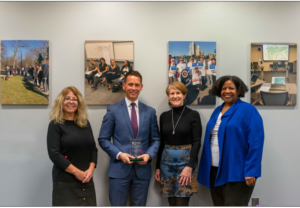 Glenn Sterner, Ph.D., assistant professor criminal justice at Penn State Abington, received the Rural Health Hero of the Year Award, presented by the Pennsylvania Office of Rural Health (PORH). The award was presented by Lisa Davis, director of PORH and outreach associate professor of health policy and administration at Penn State on Nov. 14, 2022 during a ceremony at Penn State Abington in Abington, PA.
Glenn Sterner, Ph.D., assistant professor criminal justice at Penn State Abington, received the Rural Health Hero of the Year Award, presented by the Pennsylvania Office of Rural Health (PORH). The award was presented by Lisa Davis, director of PORH and outreach associate professor of health policy and administration at Penn State on Nov. 14, 2022 during a ceremony at Penn State Abington in Abington, PA.
The award was presented during 2022 Rural Health Week in Pennsylvania, Nov. 14-18. The week encompasses Nov. 17, which is National Rural Health Day, established in 2011 by the National Organization of the State Offices of Rural Health. Both events celebrate “The Power of Rural” by honoring rural American residents, health care providers, and communities.
The Rural Health Hero of the Year award recognizes an outstanding leader who demonstrates a personal and professional commitment to the rural health needs of their community, works with relevant organizations to develop or expand a program that addresses an identified need, and goes above and beyond the call of duty.
The nomination, submitted by Danielle Rhubart, Ph.D. assistant professor of biobehavioral health at Penn State University Park, lauded Sterner for his leadership and coordination between organizations across the state. In addition to being a champion and advocate for rural communities, his work on substance use, human trafficking, and various health conditions have had meaningful impacts on rural residents of Pennsylvania. He uses an innovative approach to address multiple issues, secure funding, and has worked in partnership with state and local law enforcement agencies to deploy resources. Sterner is an influential advocate in multiple areas and consistently demonstrates his recognition of rural health issues across Pennsylvania.
In his current work, he is evaluating the impact of opioid settlement funding in Pennsylvania, with an emphasis on long-term stakeholder engagement for maximizing the impact of opioid settlement funding in Pennsylvania’s communities. He founded the non-profit organization “Regional Interdisciplinary Collaborative Working to Address Human Trafficking.” He also serves on an interdisciplinary team to increase access to prevention programming in rural counties through the Penn State PROmoting School-community-university Partnerships to Enhance Resilience (PROSPER) program, emphasizing connections between prevention and supply reduction initiatives in communities. Sterner developed the Story Powered Initiative to address stigma in communities for conditions that are discriminated against, including substance use, human trafficking, hepatitis C, and HIV/AIDS.
PORH was formed in 1991 as a joint partnership between the federal government, the Commonwealth of Pennsylvania, and Penn State. The office is one of 50 state offices of rural health in the nation and is charged with being a source of coordination, technical assistance, networking, and partnership development.
PORH provides expertise in the areas of rural health, population health, quality improvement, oral health, and agricultural health and safety. PORH is administratively located in the Department of Health Policy and Administration in the College of Health and Human Development at Penn State University Park.
Each year, PORH presents awards to recognize rural health programs and individuals who have made substantial contributions to rural health in Pennsylvania. To learn more about the Pennsylvania Office of Rural Health, visit porh.psu.edu.
Amanda Vaglia, D.O. Recognized as 2022 Rural Health Community Star
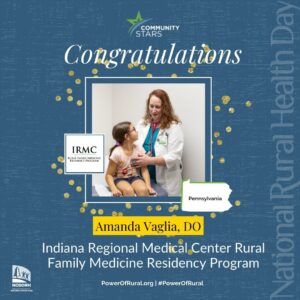
Amanda Vaglia, D.O, Primary Care Physician and Program Director at Indiana Regional Medical Center’s Rural Family Medicine Residency Program, Indiana Regional Medical Center, Indiana. PA, is Pennsylvania’s 2022 Community Star, designate by the National Organization of State Offices of Rural Health (NOSORH). NOSPRH, the member association for each of the 50 State Offices of Rural Health, leads National Rural Health Day. The Pennsylvania Office or Rural Health, University Park, PA, collaborates with NOSORH to recognize those who serve the vital needs of the estimated 57 million people living in rural America.
The nomination, submitted by Lisa Davis, MHA, Director and Outreach Associate Professor of Health Policy and Administration, Pennsylvania Office of Rural Health, University Park, PA, lauded Vaglia’s advocacy for developing the Rural Physician Residency Program at Indiana Regional Medical Center (IRMC), to ensure access to high quality health care and to training the next cohort of talented rural primary physicians. Davis notes, “Dr. Vaglia has deep roots in rural Pennsylvania and has spent her academic and professional career on providing high quality primary care to generations of families, from birth to geriatrics.”
Dr. Vaglia has been a true rural health community champion and star. She has recognized the need to recruit and retain physicians in her community, cultivate rural leadership and practice in medical residents, and address rural population health. Dr. Vaglia is focused on education, collaboration, and communication that led the efforts to fulfill the vision of establishing a family medicine residency program at IRMC, which serves as the rural sole community hospital in the county. The Rural Residency Program has at its core, the mission of providing excellent, comprehensive, family medicine training so that graduates might fill health care disparities in rural Pennsylvania communities.
Dr. Vaglia also serves on statewide Pennsylvania Rural Physician Pathway Planning Committee, a collaboration between the Area Health Education Center program, rural clinical training programs across the state, the Pennsylvania Primary Care Career Center, the Pennsylvania Academy of Family Physicians, and the Pennsylvania Office of Rural Health, to envision an innovative clinical pipeline for recruitment, training, and retention in rural communities.
The National Organization of State Offices of Rural Health’s (NOSORH) annual Community Star recognition program is one of the most popular features of National Rural Health Day. Each person, coalition, and organization nominated to be their state’s Community Star represents the faces and grassroots initiatives that are working to address the social determinants of health and improve the lives of those who call rural their home. The 2022 Community Stars book can be accessed at www.powerofrural.org.
Gov. Tom Wolf Proclaims November 14-18, 2022 Rural Health Week in Pennsylvania
In an effort to draw attention to the wide range of issues that impact rural health, Gov. Tom Wolf has declared Nov. 14-18, 2022, as Rural Health in Pennsylvania week at the request of the Pennsylvania Rural Health Association (PRHA) and the Pennsylvania Office of Rural Health (PORH).
Gov. Wolf made the proclamation to promote awareness of the full range of issues that impact rural health care throughout the Commonwealth and the health status of rural Pennsylvanians. Nationally, Pennsylvania ranks as one of the states with the highest number of rural residents, with 26 percent of Pennsylvanians residing in rural areas. In recognition of Pennsylvania’s diverse rural needs, the Commonwealth has supported the development of the Center for Rural Pennsylvania, the Pennsylvania Office of Rural Health, and other agencies and initiatives to address the needs of rural Pennsylvanians.
The week encompasses Nov. 17, which is National Rural Health Day, established in 2011 by the National Organization of State Offices of Rural Health (NOSORH) to showcase rural America; increase awareness of rural health issues; and promote the efforts of NOSORH, State Offices of Rural Health (SORHs) and others in addressing those issues.
“Nearly 59.5 million Americans, including 3.4 million Pennsylvanians, live in rural communities,” said Lisa Davis, PORH director and outreach associate professor of health policy and administration at Penn State. “These small towns and communities continue to be fueled by the creative energy of citizens who step forward to provide a wealth of products, resources, and services.
Rural communities also face unique health care concerns: a lack of providers; accessibility issues, particularly in terms of transportation and technology; and affordability issues as the result of larger percentages of uninsured and underinsured citizens and greater out-of-pocket health costs. Rural hospitals and health care providers, which frequently are the economic backbone of the communities they serve, deserve special consideration so that they can continue to provide high-quality services and meet the needs of rural residents.”
To celebrate the work being done to achieve health care access and equity in Pennsylvania, PORH will present Pennsylvania Rural Health Awards during in communities across Pennsylvania.
PORH was established in 1991 to enhance the health status of rural Pennsylvanians and strengthen the delivery and quality of care in the communities in which they live. Each year, the organization presents awards to recognize rural health programs and individuals who have made substantial contributions to rural health in Pennsylvania. To learn more about the Pennsylvania Office of Rural Health, visit porh.psu.edu.
PRHA is dedicated to enhancing the health and well-being of Pennsylvania’s rural citizens and communities. Through the combined efforts of individuals, organizations, professionals, and community leaders, the Association is a collective voice for rural health issues and a conduit for information and resources. More information can be found at paruralhealth.org.
New Measures Assess Oral Health for Pregnant Persons
The Dental Quality Alliance released two measures that are intended to assess the extent to which pregnant persons are accessing the dental care delivery system. The measures also assess routine care that includes examination, risk assessment, diagnosis, and treatment planning.
